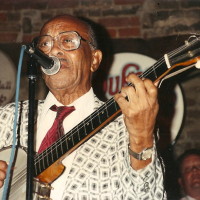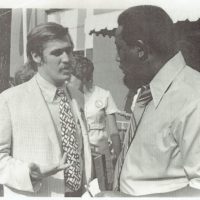
Jason Berry
Sleuth
Investigative reporters are in the business of finding things that people may, or may not, want found. And that’s pretty much what Jason Berry has been doing for most of his life. His discoveries have enhanced the general understanding of people and places that most everyone thought they already knew.
As a journalist, author and documentary filmmaker, Berry has done much of his digging by ear. He knows a good story when he hears one and his music reporting is based on interviews that are hard to forget.
A 1980s conversation with the New Orleans jazz raconteur Danny Barker may best illustrate Berry’s particular talent for finding the poem in a bucketful of prose. By then, Barker had given thousands of interviews and written an engaging memoir focusing on his long life in music. But this interview transcript shows Barker describing Louis Armstrong to Berry in an entirely original, profound and personal way:
Danny Barker: On occasion I would go backstage. Rarely would I disturb him myself to be running in his dressing room. ‘Cause he was generally busy. And, you know, (I) loved him and knew him. But as far as going and take up his time, he had to tend to business. He’d never hurt your feelings but some people would just go and spend the whole day with Louis.
You know, hanger-ons, you know, waiting for a hand out. ‘Cause he always gone give you some money. (He’d say) “How you slicking? You getting your grits? You have enough chicken? Eating? Rent’s paid?” And he’d drop something on them people, you see. All them free loaders in every town he went in. They was there. A lot of them, putting on an act. You know? But to be in his presence, to see the power he had …
See, you’d go in (the) dressing room and you’d see maybe he’d be sitting down in his underwear, with a towel around his lap, one around his shoulders, and that white handkerchief on his head, and he’d put that grease around his lips — (he’d) look like a minstrel man, you know, with the white? And laughing — natural, see, the way he is. And in the room you’d see maybe two nuns. You’d see a street walker dressed all up in the flaming clothes. You’d see maybe a guy that’s come out of penitentiary. You’d see maybe a blind man, sitting there. You’d see a rabbi. You’d see a a priest, see? I would see two policemen or a detective, see? You’d see a judge.
Jason Berry: All in the dressing room?
Danny Barker: All of ’em in different levels of society in the dressing room and he’s talking to all of them. And he’d say, “Sister So-and-So, do you know, uh, this is Slick Sam? Well, this is Slick Sam, an old friend of mine.” So the nun’s gonna meet Slick Sam (who’s) old, notorious, been in nine penitentiaries. “Slick Sam, meet Rabbi Goldstein over there. He’s a friend of mine, rabbi’s a good man, religious man. Sister Margaret, do you know Rabbi Goldstein?” You know, one of them things.
”You know, this is Rosie? Good Time Rosie is a girl used to work in a show with me years ago. Good girl, she’s a great performer — never got the breaks she (should have) got. But if she’d ever have got the breaks, she’d be a star on Broadway today.” Always a word of encouragement, see. And there’d be some little kids there. Some little kids — white and colored — with their autograph books. All them diverse people of different social levels of endeavor in the same dressing room and he’s not making no pretense over this one or over that one. And everybody’s looking, got their eyes dead on him just like they were looking at a diamond. That’s Louis Armstrong.

Of course, it’s entirely possible to be familiar with Jason Berry’s work without ever knowing about his life-long interest in New Orleans music. He’s reported extensively on other topics, including the predation of Catholic priests in Louisiana who sexually abused children. He began writing on the topic in the mid-1980s. Since then, he’s expanded the scope of his reporting to include financial misdeeds within the church — leading all the way to the Vatican — which have taken place, in part, to cover up confirmed incidents of sexual abuse.
Berry’s stories, books and documentary work on the sex crimes committed by priests initially stirred loud and prolonged condemnation from many who refused to believe what he had found. Today, he’s credited with having helped lay the groundwork for worldwide reporting on the subject.
Berry’s work has even found its way into popular culture. His 1992 book, Lead Us Not Into Temptation: Catholic Priests and the Sexual Abuse of Children, appears in the 2015 film, Spotlight, which tells the story of similar criminality and cover up among Catholic priests and those hired to protect them in and around Boston. Spotlight won the Academy Award for Best Picture.
Berry says he exhibited a precociousness in writing that inspired praise early on:
Berry: I was encouraged to write by my mother at a very young age. In fact, I think I was four, maybe five, and I wrote a story — it has been lost to humanity sadly. It’s called “Cities of Sand” … I don’t remember anything about the story except my mother typed it up and she sent it to the Times Picayune.
Gwen: She did? How old were you?
Berry: I think I was five.
Gwen: Did you get the byline?
Berry: No, some editor sent a letter back (imagine that happening today) but the guy sends a letter back and says, “Sorry, we don’t have room for it, but your son has great talent and we encourage him to go forth.”
Not many mothers would have the confidence to send a five-year-old’s writing to the local newspaper. But Mary Frances Berry was different from most mothers at the time. “She wasn’t really a stay at home mom, though she was home when my younger brothers and I — there were three of us — were growing up,” Berry tells Gwen. “By the time we were in school, she went to Tulane to get her master’s in English … Then she ended up getting everything but the doctorate.”
Later, Berry’s mother became a guidance counselor/parole officer in Orleans Parish. “Even though she didn’t have a degree in counseling … Here is this lady who wrote about Restoration Drama in England, counseling African American youth trying to help them avoid going to jail,” Berry notes.
Berry’s professional writing career began early in 1971, when he graduated from Georgetown University in Washington, D.C., and traveled soon after to Mississippi. There he joined the Charles Evers gubernatorial campaign as its press secretary.
He had gone thinking he’d be a volunteer in a long-shot, historic gambit that might just put a black man in the governor’s mansion. It would be a first for Mississippi and, at that time, for any other state in the union, post-Reconstruction. Charles was not only the mayor of Fayette, Mississippi and the charismatic brother of the murdered civil rights leader Medgar Evers, but he was a canny practitioner of realpolitik in a state with a history of extreme poverty, racism and violence.
In 1971, most black Mississippians had yet to become accustomed to participating in elections. They had only attained the guaranteed right to vote six years earlier, with the passage of the 1965 Voting Rights Act. That legislation was still unpopular among the majority of white voters across the state, making the Evers campaign a civil rights victory well before election day. His campaign helped spur other black candidates in Mississippi and may have smoothed the road to the polls psychologically for many black voters.

And yet, the Evers campaign was something of a Greek odyssey for everyone involved, as the team faced a menacing and often surreal resistance from the top to the bottom of the state. Berry’s chronicle of those months became his first book, Amazing Grace, With Charles Evers in Mississippi:
For a time there was an aura of fortitude to the campaign trips, but it wore off quickly. A German journalist touring with us one Sunday kept looking out of the window to see if we were being followed. He couldn’t understand the frivolity and havoc of our group. (“Lois, don’t lose them buttons, they cost money … Elix! Elix? where’s he gone to? … Magnolia, they’re serving chicken at the community center. Make sure mine ain’t got no pepper. I caint take pepper … Jason, take care o’ our German friend here.”) The trips were such a web of human spirits woven together, differing, holding to one another in moments of humor, reacting to and partaking of our various pasts, that we were often oblivious to thoughts that things might be unsafe.
Courage was one quality already imbued in each black person in the office, for all of them had gone through hard years before most of the whites knew who Charles Evers was. When Ed Cole talked about the days of SNCC, I tried to imagine myself walking into a restaurant with a group of blacks or trying to register voters in Philadelphia in 1965. I was a myopic teen-ager then, playing football and going to drive-ins. Sometimes I tried to imagine whether I would have gone down to Mississippi as a civil rights worker in 1964 had I been of age. I never was able to decide.
— Amazing Grace, pp. 128-129. Jason Berry, 1973. Saturday Review Press, New York.
Perhaps it was there that Berry learned first-hand that elections are almost always about more than two opposing candidates and that success and defeat are never as plain as the numbers suggest. In an election riddled with irregularities, Evers lost the Mississippi governor’s race by a whopping 420,000 votes. But his campaign succeeded in helping more than 50 other black candidates win local elections across the state.
“I went back to New Orleans and I spent the next year both in the city and at a summer place my folks had out in rural Mississippi, near Poplarville,” Berry told Gwen. “I just worked night and day. I was so filled up with the experience I had, and I read constantly and wrote.”
He was 23 years-old. Berry dedicated Amazing Grace to Charles Evers and to his father, a company executive, who was also named Jason Berry.
“We were taught, my brothers and I, to be polite. To stand up when a lady entered a room, to say “Ma’am” and “Sir,” to never use profanity, to never use racial epithets. I don’t know if this is a liberal upbringing or an enlightened upbringing. We were expected to be decent.”
Jason Berry
On a trip to Europe, shortly after Amazing Grace was published, Berry became newly curious about more familiar ground.
“Every place I went, as young people do, you trade stories: ‘Who are you? Where are you from?’ and I’d say, ‘New Orleans’ and their eyes would light up. I kept thinking, ‘What is it I don’t know about where I’m from.’”
And that was the beginning of a lifetime of writing about New Orleans.
“I was starting to write these articles for everybody under the sun,” he told Gwen. “I was writing about politics. I was writing about music. I was writing brilliant fiction that someone never managed to attract a contract from New York! I had two novels that I worked on over the next several years … I think the education I got writing about the city was worth a PhD anywhere else.”
Now in his early 70s, and looking back over countless interviews and published stories, half a dozen books on a range of topics, and three documentaries, Berry seems optimistic about the city’s future and his own. But there’s a caveat. The future of New Orleans, Berry says, will depend on whether New Orleanians are willing to delve more honestly into their city’s history of racial bias.
“I think more and more as young people are taught the true history — not the Lost Cause stuff we got when I was in high school … The more people come to terms with this, it allows for a broader understanding of what humanity is really like, “ he told Gwen. “I think in that sense New Orleans is a place — if we can survive climate change — (where) I think we have a decent shot as becoming a true mecca for international visitors, even more so than we are today.”
Berry’s film, City of a Million Dreams, is set for release in Fall, 2021. But that hasn’t stopped him from working on his next book about an as-yet-unnamed subject. So stay tuned. If Berry’s digging, chances are he’ll find yet another poem in a bucketful of prose.
— Gwen Thompkins
City of a Million Dreams
Since we spoke with Jason Berry, his film was chosen as an official selection of the 2021 Sarasota Film Festival. You can watch the trailer below, and follow the film’s progress to the big screen on Facebook.
Playlist
Each week we publish a playlist with all the music heard on the program. Feel free to consult it while browsing for music at your favorite local retailer.
